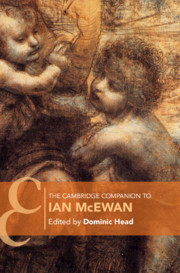Book contents
- The Cambridge Companion to Ian McEwan
- The Cambridge Companion to Ian McEwan
- Copyright page
- Contents
- Contributors
- Chronology
- Abbreviations
- Introduction
- 1 ‘Shock Lit’
- 2 Moral Dilemmas
- 3 Science and Climate Crisis
- 4 The Novel of Ideas
- 5 Cold War Fictions
- 6 The Construction of Childhood
- 7 The Public and the Private
- 8 Masculinities
- 9 The Novellas
- 10 Realist Legacies
- 11 Limited Modernism
- 12 Narrative Artifice
- Further Reading
- Index
- Cambridge Companions To…
10 - Realist Legacies
Published online by Cambridge University Press: 24 June 2019
- The Cambridge Companion to Ian McEwan
- The Cambridge Companion to Ian McEwan
- Copyright page
- Contents
- Contributors
- Chronology
- Abbreviations
- Introduction
- 1 ‘Shock Lit’
- 2 Moral Dilemmas
- 3 Science and Climate Crisis
- 4 The Novel of Ideas
- 5 Cold War Fictions
- 6 The Construction of Childhood
- 7 The Public and the Private
- 8 Masculinities
- 9 The Novellas
- 10 Realist Legacies
- 11 Limited Modernism
- 12 Narrative Artifice
- Further Reading
- Index
- Cambridge Companions To…
Summary
Ian McEwan’s post-realism is part of a marked aesthetic shift that began in the last decades of the twentieth century and continues into the twenty-first. His novels, with their attention to close description and dependence on context as well as a qualified sense that language can capture inner and outer worlds, are part of a turn to the kinds of realism characteristic of the long nineteenth century. The essay argues the turn is transformative rather than nostalgic because, like so many of his contemporaries, McEwan responds to contemporary socio-political crises by means of postmodern strategies that include parody, irony, hybridity and metafiction. Three mid-career novels that loosely share the geopolitical context of World War II and the Cold War illustrate the argument: The Innocent, Black Dogs and Atonement. Postmodern technique and novelistic realism together provide a vehicle for McEwan’s long-standing exploration of human violence across both public and private spheres.
Keywords
- Type
- Chapter
- Information
- The Cambridge Companion to Ian McEwan , pp. 150 - 164Publisher: Cambridge University PressPrint publication year: 2019
- 3
- Cited by

